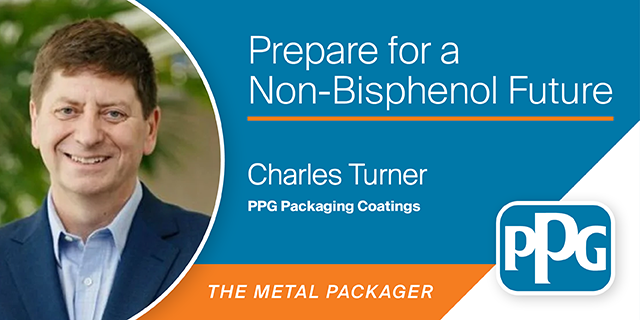Increasing regulatory and consumer pressure to ban BPA
The challenge of removing bisphenols from industrial operations for can manufacturers can be compared to a tire factory attempting to eliminate rubber onsite. That’s what’s ahead for the industry.
Can makers face increasing regulatory and consumer pressure to ban bisphenol-A (BPA) and the wider use of bisphenols. Most notably, the European Food Safety Authority (EFSA) proposed a new tolerable daily intake (an amount of a substance in food or beverage that can be taken in daily over a lifetime without appreciable health risk) for BPA that’s expected to essentially ban it from food packaging use in Europe.
Although the move impacts a wide range of industrial operations, the step has gained the attention of global can makers and accelerated discussions about non-BPA conversion in markets where the adoption of non-BPA coatings was believed to be years away. While these pending regulations have arrived sooner than many expected, greater supplier collaboration and ongoing coatings innovation will prepare the industry for what’s ahead.
The multiple-step approach
BPA remains ubiquitous in manufacturing and the environment. Removing BPA from all aspects of the industrial process requires a comprehensive approach, including a complete assessment of operations, establishing an equipment cleaning regime and developing non-BPA best practices. Operations will first need to deep dive into procedures to assess BPA sources, whether coatings, pipework, or other sources in the industrial process. All BPA sources must be understood because of the proposed ultra-low BPA limits. Next, separating and isolating BPA materials from non-BPA materials will be essential to avoid cross-contamination. Finally, it’ll be necessary to establish an equipment cleaning regime with appropriate analytical confirmatory checks to drive out BPA.
The most challenging consideration remains how to effectively manage the transition phase when both BPA and non-BPA products are produced on the same site. Developing and managing a transition phase plan will be critical. Operations will need to ask themselves: How will we ensure no cross-contamination? Will we need to segregate production lines and/or factories? Then establish a BPA handling policy with non-BPA best practices or standard operating procedure documents for managing BPA through full eradication. This may be key for future auditing requirements and to demonstrate compliance with the pending regulation.
Non-BPA solutions
Converting to non-bisphenol coatings solutions marks a start to the non-BPA transition. For example, PPG offers a complete range of protective internal and external non-BPA coatings, including PPG Innovel PRO, PPG HOBA, PPG Nutrishield, and iSENSE solutions. The complete removal of bisphenol-starting substances from can coatings aligns with PPG’s decades-long non-bisphenol strategy. The approach results from years of research and customer feedback to ensure reduced migration, improved application properties, and operational benefits for plants around the globe. PPG also prescribes its PPG SAFEASSURE for enhancing the consumer‑safety side of sustainability in its packaging coatings.
With billions of cans coated with PPG non-BPA coatings, PPG’s experienced packaging coatings global technical services team works with customers to trial and optimise non-BPA coatings on their production lines for a smooth transition.
The right coatings partner
It’s important to understand that transitioning to non-BPA requires more than a switch to a non-BPA coating. Operations will need to assess the entire manufacturing process and develop best practices for BPA handling. The far-reaching impact for the industry in removing BPA from operations requires the right coatings partner. A forward-thinking coatings partner closely monitors the ever-evolving global regulations to ensure long-term regulatory-compliant solutions and the latest scientific research on BPA that keep can makers and consumer goods brands ahead of the trends. PPG has the answers and expertise to support these efforts to ensure success in a non-BPA future.
Charles Turner is PPG’s EMEA Technical Director and Global Director of Regulatory Affairs for Packaging Coatings. He has more than 38 years of experience in packaging and is currently responsible for leading PPG’s research and development efforts in EMEA and PPG’s and its customers’ regulatory affairs. PPG’s Packaging Coatings business creates effective coating solutions for nearly all metal packaging end-use in the beverage, food, cosmetic, and personal care industries. To learn more, visit www.packagingcoatings.com and sustainability.ppg.com.
Editor’s Note: This article first appeared in The Metal Packager magazine on April 24, 2023. You can access the article here.


